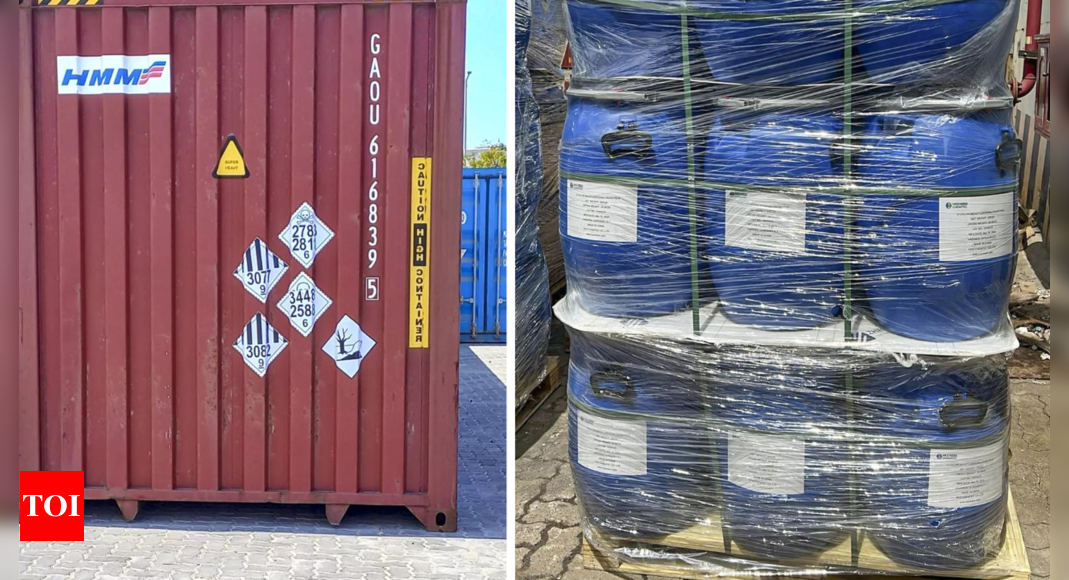Legal Implications Of Selling Banned Chemicals On EBay: Section 230 Scrutinized

Table of Contents
Understanding Section 230 and its Applicability to eBay
Section 230 of the Communications Decency Act of 1996 is a crucial piece of legislation that shapes the internet as we know it. It generally protects online platforms from liability for user-generated content. This means that websites like eBay are not typically held responsible for what their users post or sell, unless they are actively involved in creating or facilitating illegal activity. However, this protection is not absolute.
- Section 230 does not offer complete immunity. While it provides significant protection, it's not a shield against all liability.
- Active participation in illegal activity negates protection. If eBay actively participates in, or facilitates, the sale of banned chemicals, its Section 230 protection diminishes significantly.
- Knowledge of illegal listings weakens Section 230 protection. If eBay is aware of listings selling banned chemicals and fails to take action, its legal standing becomes vulnerable.
- eBay's proactive measures to prevent illegal listings. eBay employs various methods to detect and remove prohibited items, including automated systems, human moderators, and user reporting mechanisms. However, the sheer volume of listings makes complete prevention impossible.
Identifying Banned Chemicals and Regulated Substances
The range of chemicals banned or heavily regulated is extensive and varies depending on federal, state, and even local laws. It's crucial to understand that selling even seemingly innocuous chemicals could have serious legal consequences.
Examples of commonly banned or restricted chemicals include:
- Pesticides: Many pesticides are strictly regulated due to their potential environmental and health hazards. Selling unregistered or banned pesticides is illegal.
- Precursors for illicit drugs: Chemicals used in the production of illegal drugs are often subject to strict control and licensing requirements. Their sale without proper authorization is a serious offense.
- Hazardous materials: The handling, storage, and transportation of hazardous materials are regulated by numerous agencies, including the EPA and OSHA. Failing to comply with these regulations when selling such materials on eBay can lead to severe penalties.
Resources for identifying banned chemicals:
- Environmental Protection Agency (EPA): The EPA website provides comprehensive information on regulated pesticides and other hazardous substances.
- Drug Enforcement Administration (DEA): The DEA website lists controlled substances and their regulations.
- State and local environmental agencies: Check with your state and local agencies for specific regulations in your area.
The risks associated with misidentification of chemicals are substantial. Incorrectly identifying a chemical can lead to violations of safety regulations and legal issues. Similarly, selling mislabeled or misrepresented chemicals can have serious consequences.
eBay's Policies and Enforcement Procedures Regarding Banned Items
eBay has specific policies prohibiting the sale of many dangerous and restricted items, including banned chemicals. These policies are designed to protect both buyers and sellers, and violation can result in severe penalties.
- eBay's verification and monitoring systems: eBay uses automated systems and human reviewers to scan listings for prohibited items.
- Reporting mechanisms for users to flag suspicious listings: eBay encourages users to report any listings they suspect violate its policies.
- eBay's cooperation with law enforcement agencies: eBay actively collaborates with law enforcement to investigate and prosecute sellers involved in illegal activities.
Consequences for sellers who violate eBay's policies include:
- Account suspension: eBay may suspend or permanently terminate the accounts of sellers who repeatedly violate its policies.
- Legal action: In severe cases, eBay may cooperate with law enforcement to pursue legal action against sellers.
The Role of Seller Intent and Due Diligence
While intent is a factor in legal proceedings, ignorance of the law is not a valid defense. Sellers have a responsibility to exercise due diligence to ensure that they are not selling banned or regulated chemicals.
Due diligence includes:
- Thoroughly researching the legality of the chemicals you plan to sell.
- Properly labeling and packaging the chemicals to comply with all applicable regulations.
- Using safe shipping methods appropriate for hazardous materials.
- Maintaining detailed records of all transactions, including buyer information and shipping details.
Consequences of failing to exercise due diligence can include:
- Fines and legal action.
- Civil lawsuits from injured parties.
- Reputational damage.
Potential Legal Penalties and Civil Liabilities
Selling banned chemicals on eBay exposes sellers to a wide range of potential legal penalties and civil liabilities.
- Fines and criminal charges: Depending on the severity of the offense and the quantity of chemicals involved, sellers could face substantial fines and even criminal charges.
- Injunctions and cease-and-desist orders: Courts may issue injunctions to prevent sellers from continuing to sell banned chemicals.
- Civil liability for damages and injuries: Sellers could be held civilly liable for any injuries or damages caused by the chemicals they sell. This can include significant financial compensation to victims.
Environmental regulations and liability add another layer of complexity. The improper disposal or handling of banned chemicals can result in environmental damage, leading to substantial fines and legal actions from environmental agencies.
Conclusion
Selling banned chemicals on eBay carries significant legal risks, irrespective of Section 230 protections. Understanding relevant regulations, eBay's policies, and the potential for severe penalties is crucial for all sellers. Failure to exercise due diligence can lead to substantial fines, legal action, and reputational damage. Always verify the legality of any item before listing it and familiarize yourself with the constantly evolving legal landscape surrounding the sale of regulated substances. Avoid the potential legal pitfalls of selling banned chemicals on eBay and prioritize responsible online selling practices. If you are unsure about the legality of a chemical, it's best to err on the side of caution and not list it for sale.

Featured Posts
-
 Monaco Grand Prix 2025 Live Streaming And Broadcast Information
May 26, 2025
Monaco Grand Prix 2025 Live Streaming And Broadcast Information
May 26, 2025 -
 What Is A Flash Flood Emergency And How To Stay Safe
May 26, 2025
What Is A Flash Flood Emergency And How To Stay Safe
May 26, 2025 -
 Land Of Sometimes A Look At Tim Rices New Lion King Lyrics
May 26, 2025
Land Of Sometimes A Look At Tim Rices New Lion King Lyrics
May 26, 2025 -
 Plan Your Trip D C Pride 2024
May 26, 2025
Plan Your Trip D C Pride 2024
May 26, 2025 -
 Saksikan Aksi Mendebarkan Moto Gp Inggris 2025 Link Live Streaming Sprint Race Pukul 20 00 Wib
May 26, 2025
Saksikan Aksi Mendebarkan Moto Gp Inggris 2025 Link Live Streaming Sprint Race Pukul 20 00 Wib
May 26, 2025
